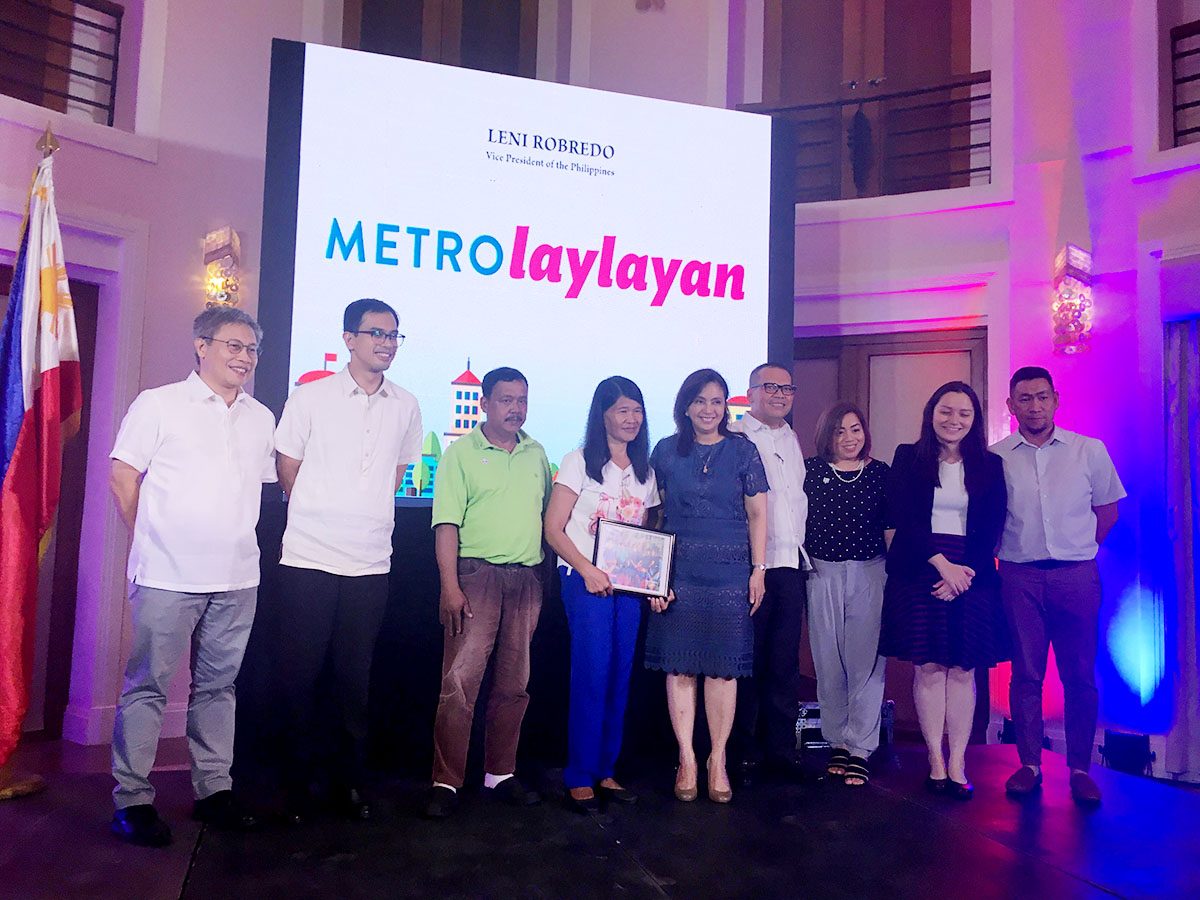SUMMARY
This is AI generated summarization, which may have errors. For context, always refer to the full article.

MANILA, Philippines – When Cecilia Eraya, 53, was asked what she hopes for her sari-sari store in the future, she answered, “Gusto ko sanang pandagdag-puhunan.” (I would appreciate more capital.)
Given funds to start a sari-sari store, the Eraya family is one of the 10 beneficiary families of the Metro Laylayan program by the Office of the Vice President (OVP). Metro Laylayan provides livelihood opportunities for families in need in Metro Manila and surrounding areas.
They along with other beneficiary families came to a thanksgiving dinner on Wednesday, June 20, at the OVP in celebration of Metro Laylayan’s first anniversary.
Vice President Leni Robredo graced the event not only to share stories of the beneficiary families but also to acknowledge the partners of the program. (READ: Robredo’s Metro Laylayan assists 10,000 beneficiaries in 1st year)
A year after the implementation of program, how would the beneficiaries rate the program? For Nanay Cecilia, it could definitely do better.
Current situation
The Erayas were given P10,000 in cash in January to set up their own sari-sari store, along with groceries and rice.
Because of this, Nanay Cecilia said she no longer waits for her husband, Tatay Benjie, to come home from making tricycle rounds to give her daughter allowance. With a constant stream of income from the store, she had also stopped borrowing money from her neighbors.
Despite these, she claimed that the help is not really enough.
“Sa ngayon, medyo kulang na ‘yung mga items. Onti na lang natira, kaya medyo [naghihingalo]. Sinisikap ko rin makabenta,” she said. (For now, the items are dwindling, but I still try to make sales.)
Nanay Cecilia hopes more sponsors will help her sell more products as she is competing with her neighboring sari-sari stores. According to her, customers would ask her for items she does not have, such as school supplies.
It does not help that Tatay Benjie drives a tricycle he does not own. He would borrow one for P150 a day. According to Nanay Cecilia, he sometimes he earns just enough to pay this boundary.
College woes
With a daughter who just graduated from senior high school and now all set to study BS Mechanical Engineering in college, Nanay Cecilia is also concerned with being able to support her eldest daughter’s education.
While Gicelle, 18, qualified for a full scholarship at the Colegio de Muntinlupa, Nanay Cecilia noted that she may not be able to provide for the miscellaneous expenses such as books, uniforms, and transportation.
Ultimately, Nanay Cecilia hopes for more support as she struggles to make her small business thrive so she can continue sending her children to school. Nevertheless, she thanked the Vice President for the help her office extended to them.
“Naabot ‘yung mga nandu’n sa kasuluk-sulukan ng mga mahihirap, at alam kong marami pa pong mahihirap kaysa sa amin, sana matulungan mo pa rin sila,” she said. (You reached out to the poorest of the poor, and I know there are people who are poorer than us, I hope you can help them, too.)
Responding to Nanay Cecilia’s feedback, Metro Laylayan program officer Dion Romano said the capital fund they provided aims to augment the family’s income and not to cover all their needs.
He added that they will include Nanay Cecilia in the financial literacy training workshop for sari-sari store owners, which will be facilitated by partner organizations Hapinoy and Sunlife Foundation.
“With that, we hope that Nanay Celi will learn the necessary business skills to make her sari-sari store progressive,” said Romano.
He stated that Metro Laylayan will continue to monitor the progress of the Eraya family and the other family beneficiaries, especially in terms of the intervention they have provided.
The OVP does not full subsidize the program, given its low budget. To support its operations and continue providing assistance to families, the OVP links private companies and non-government organizations with local government units instead.
According to OVP, the program has successfully provided various types of assistance to some 10,000 individuals across Metro Manila and nearby areas after a year of implementation. – Rappler.com
Loreben Tuquero is a Rappler intern. She is Communication student at the Ateneo de Manila University.
Add a comment
How does this make you feel?





There are no comments yet. Add your comment to start the conversation.